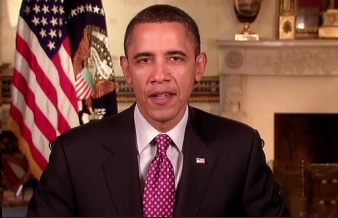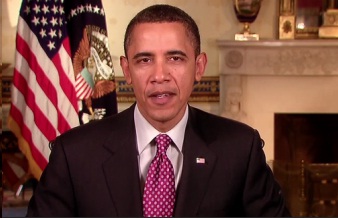 The president gives a preview of his budget in his weekly address.Republicans are vowing to fight President Obama’s newly released budget for the 2012 fiscal year. Among other things, the new budget includes a few significant changes to spending on climate and energy research. In the energy sector, it calls for slashing tax breaks and loopholes for fossil fuel producers to bring in about $4 billion dollars of additional revenue. Obama has asked to end these fossil fuel subsidies in the past two years’ budgets, however, and was shot down each time.
The president gives a preview of his budget in his weekly address.Republicans are vowing to fight President Obama’s newly released budget for the 2012 fiscal year. Among other things, the new budget includes a few significant changes to spending on climate and energy research. In the energy sector, it calls for slashing tax breaks and loopholes for fossil fuel producers to bring in about $4 billion dollars of additional revenue. Obama has asked to end these fossil fuel subsidies in the past two years’ budgets, however, and was shot down each time.
(Meanwhile, a House bill called the Ending Big Oil Tax Subsidies Act would go much farther, targeting $40 billion in big oil tax breaks. It seems no one is sure, even roughly, how much fossil fuel tax breaks amount to.)
If the budget is approved, the extra revenue from ending these tax breaks would help pay for proposed boosts elsewhere. Overall, the U.S. Department of Energy budget would rise 12 percent to $29.5 billion. The budget for the Advanced Research Projects Agency for Energy, dedicated to funding cutting-edge technologies, would jump from $398 million to $550 million.
Another winner would be the National Oceanic and Atmospheric Administration (NOAA), with boosts in funding for more satellites to keep an eye on the planet and upgrade the fledgling National Climate Service so it’s on par with the National Weather Service.
Hydrogen comes in as the big loser. Its boosters may be stung by the proposed 40 percent cut in research on hydrogen; the administration argued the money is better spent on other technology that may reach scale much sooner.
In case all these “millions” and “billions” give your eyes an unhealthy glaze, this chart puts the proposals for various areas of research and development in perspective. Even with boosts for the energy sector, defense research still takes more than half the cake.
But even before the budget was released, Republicans in Congress vowed to fight it. House Republicans proposed chopping NOAA’s budget by nearly a quarter. Other party members have proposed shifting NASA’s focus back to a bygone era, with less earth science and more rockets.
It’s not just America where budget woes may stymie climate efforts. In the U.K., Prime Minister David Cameron is continuing his “bonfire of the quangos,” referring to quasi-governmental groups set up to advise government. Many of them may face the ax — including some set up to fight climate change. Meanwhile, the Carbon Trust, the government’s main agency dedicated to cutting carbon emissions, has had its own funding cut by 40 percent.
Foodpocalypse? Meanwhile, the mercury keeps rising. In January, America looked from space like a giant snow globe, with a snowpocalypse swamping the eastern United States. But, climate change deniers be damned, globally January was actually the 17th-warmest on record, according to new data from NOAA.
The ongoing warming may be hampering harvests, with dramatic knock-on effects. Fires raged across Russia last summer, and monsoon floods pummeled Pakistan and Australia — all of which may have been made more likely by climate change. Finding the fingerprint of climate change on such events has been difficult, however — but two new studies find climate change has intensified rainfall, making heavy downpours much more likely.
Coming “climate chaos” could cause falling crop yields, mass migrations and defense nightmares, the U.N.’s top climate official said in a speech at Spain’s national defense college. Food prices have reached a 20-year high, the U.N. Food and Agriculture Organization announced earlier this month. High food prices fall hardest on the poor, and helped trigger the protests in Tunisia that toppled the country’s repressive government, shares Paul Krugman.
With growing turmoil across the Middle East, including Yemen, Egypt, and Iran, other contributing factors have come up as well — such as Secretary of State Hillary Clinton’s mention of water shortages and dwindling oil production putting the squeeze on many countries.
PetroLeaks: Worries about dwindling oil supplies were stoked by WikiLeaks’ release of four cables from the U.S. embassy in Saudi Arabia, in which a former senior Saudi oilman said his country had hugely exaggerated its reserves. If new oil is truly getting much harder to find, it would explain a number of developments. Exxon, the world’s biggest private oil company, has fallen behind, not finding enough oil to keep up with its production. Shell also came out with gloomy scenarios for future oil supplies.
It appears catastrophes such as the Deepwater Horizon spill are capable of opening all sorts of rifts: A conflict over proceeds from a technology that assisted in cleaning up the Gulf oil spill has pitted two actors against each other, with Stephen Baldwin suing Kevin Costner.
The Climate Post offers a rundown of the week in climate and energy news. It is produced each Thursday by Duke University’s Nicholas Institute for Environmental Policy Solutions.



